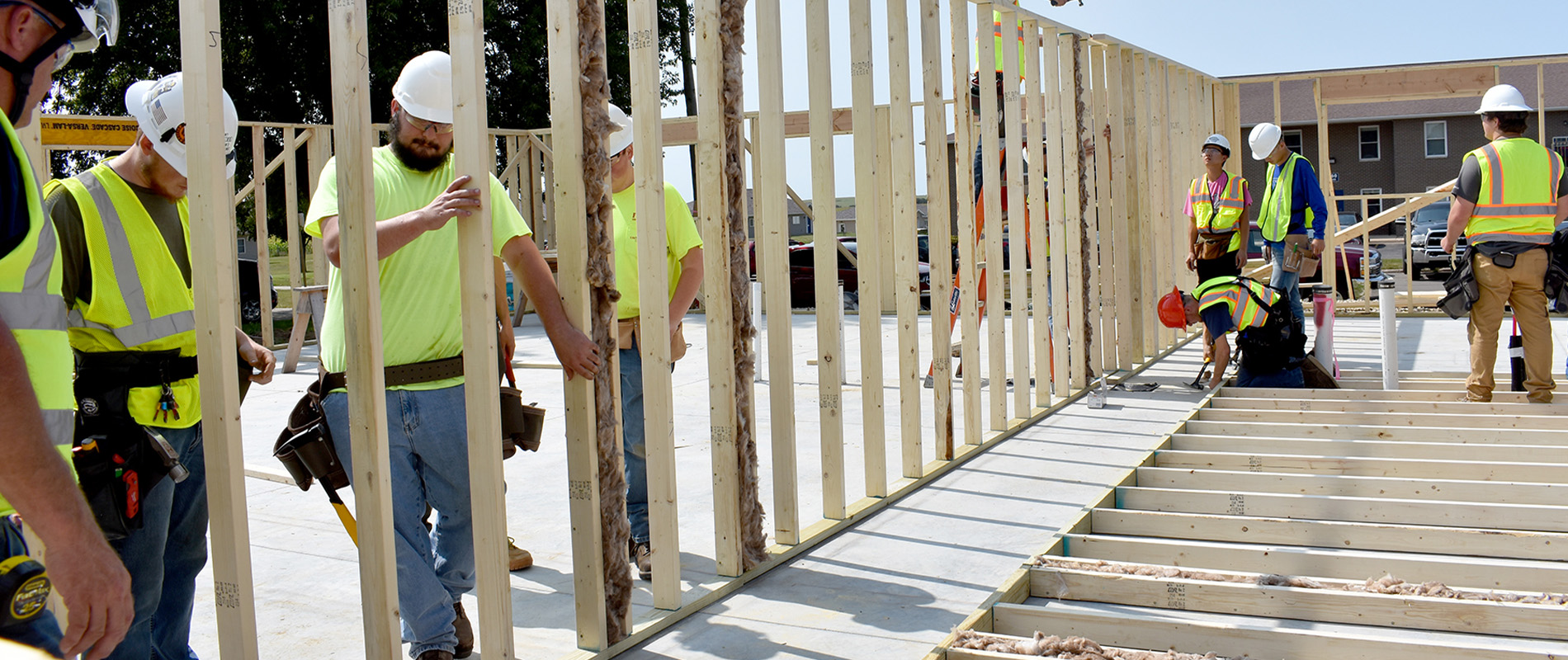Building Trades-Carpentry students are trained to construct residential structures using both standard and sustainable building materials. Students will prepare for this career through a blend of classroom theory and hands-on experience. Students will become adept at using hand tools, portable power tools, and other equipment common in the carpentry profession, as well as working with lumber, panel products, concrete, roofing materials, fasteners, and a variety of hardware. The skills needed for site layout and foundation work, rough framing, roof framing, and exterior and interior finish work will also be developed. In addition, blueprint reading, math, and estimating components will be studied.
- Overview
-
Is This Program for You?
Do you like making things and working with your hands? Are you detail-oriented and do you enjoy physical work in the outdoors? A career in Building Trades-Carpentry may be for you.
Students entering the Building Trades-Carpentry program should:
- Enjoy hard physical work.
- Enjoy working outdoors at times.
- Be able to lift 100 pounds.
- Have good hand eye coordination.
- Be concerned with detail and accuracy.
Program Basics
- Technical diploma, requiring a minimum of one year to complete.
- Day classes.
- High school articulation courses accepted.
- Financial aid available.
- Classes start in August.
- Curriculum & Costs
-
It is the student's responsibility to purchase and wear a hard hat.
Cost of Attendance (COA) 25-26
Cost of Attendance (COA) is a total of all the usual expenses of being a student. The COA sets the maximum amount of financial aid a student can receive.
Category Amount Tuition and Fees $4,932 Living Expenses (Housing and Food) $10,305 Books and Supplies $1,463 Personal Expenses $3,065 Transportation $4,103 Charger Tech 360 Fee $700 Loan Fees $85 Yearly Total (Living Away from Home) $24,653 1 Semester Total (Living Away from Home) $12,327 Based on Wisconsin Residents.
Approximate school costs are for a full-time (12 credit) student over a semester span of 17 weeks.
Fees are legislated by the Wisconsin Technical College System Board.
These costs are estimates and are subject to change without notice.
- Admissions & Requirements
-
Admission and Program Requirements
- Submit Application
Most programs admit students as applications are completed. For certain high-enrollment programs with limited space, applications are reviewed in order of residency and review dates. Programs currently in this category include Radiography, Electrical Power Distribution, Midwifery, Cosmetology, and Nail Technician. Learn more about our Admissions and Wait List Policy.Academic Preparedness Requirements
- Log in to your MySWTC account, go to My Profile → Document Center → All Programs to complete the following:
- Send your transcripts and scores to Southwest Tech: While not required, sending your transcripts and test scores helps us make sure your classes are the right fit. We consider any previous college credit you’ve earned, Accuplacer or ACT scores, high school GPA, or an assessment at your registration session. Submit your high school transcripts, college transcripts, and test scores by emailing admissions@swtc.edu, or mailing them to Southwest Tech, Attn: Admissions, 1800 Bronson Blvd, Fennimore, WI 53809
- Career Assessment Plan
Start your Student Success Plan by exploring your career interests, talking through your program choice, and confirming your path feels like the right fit. This step can be completed either by setting up a One-on-One Career Assessment Meeting with a recruiter or as part of your Student Success Plan Meeting with an advisor. Schedule a Student Success Plan Meeting by clicking “Make an appointment” with your program advisor. - Academic Map + Supports & Services Plan
Continue building your Student Success Plan by planning your courses, reviewing funding options, and connecting with resources. To complete this step, schedule a Student Success Plan Meeting by clicking “Make an appointment” with your program advisor.
- Submit Application
- Outcomes
-
Program Outcomes
At the completion of the program, students are expected to be able to:
- Use hand and power tools and equipment
- Apply industry recognized safety practices and procedures
- Analyze sustainable building practices
- Interpret construction drawings
- Interpret building codes
- Demonstrate industry building practices and material application
- Attain the OSHA 10-hour course completion card as an orientation to occupational safety and health for workers in the construction field.
- Career Opportunities
-
The U.S. Department of Labor and the Wisconsin Department of Workforce Development statistics show that carpenters will continue to be in strong demand as both one of the top 30 occupations with the most annual openings and occupations with the most employed. Local job market data also supports the need for entry-level carpenters who have a good foundational background of knowledge and skills along with a desire to work. Carpenters may work alone or for small or large contractors. They may specialize in certain aspects of the trade such as rough or finish carpentry, remodeling, or repair work. They may build residential, agricultural, and/or commercial buildings.
Southwest Tech's Career Connections Center offers Services to assist students looking for job placement.
- Transfers
- Prior Learning
-
Credit for Prior Learning
Experience Pays! You've Been There... You've Done That... Let's See If You Can Get Credit For It!
Credit for prior learning gives you opportunities to earn credit for college-level knowledge that you have already acquired. This may be the result of work or volunteer experiences, certifications, apprenticeships, military training, extensive self-instruction, or professional development. Credit for Prior Learning affords you the opportunity to accelerate the completion of your educational goals.
For more information on Credit for Prior Learning see our Credit for Prior Learning page.
At any time, you may Request Credit for Prior Learning.
Building Trades-Carpentry Courses that may have Credit for Prior Learning options:
Course # Course Title Challenge Exam
(Demonstration)Challenge Exam
(Standard)CLEPCredentialPortfolio31-801-310 Workplace Communication 
31-804-305 Applied Mathematics 
College Mathematics CLEP Test would also be accepted.

